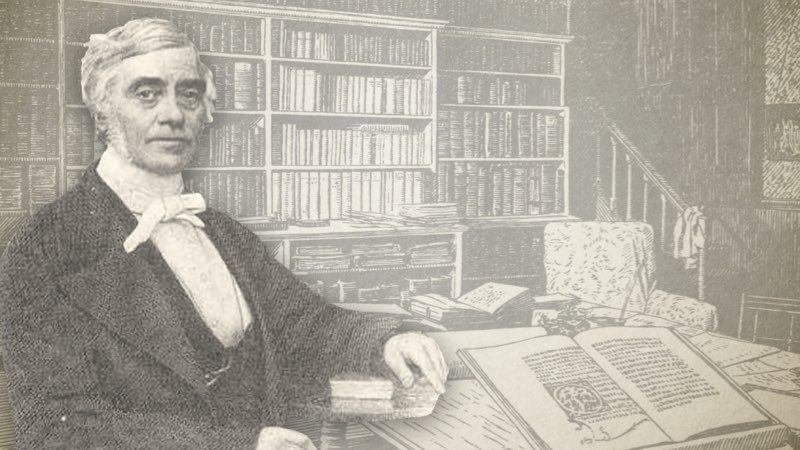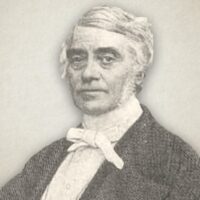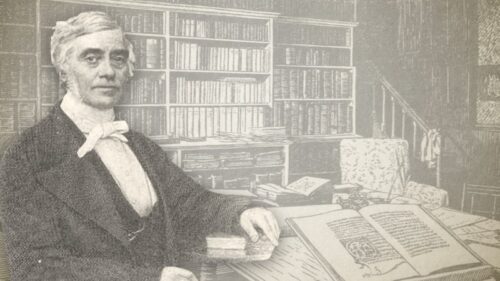
Seeking God’s Will
October 11, 1833
My dear Joseph Parry,—Grace, mercy, and peace be multiplied unto you through the experimental, soul-humbling, soul-melting, soul-rejoicing knowledge of the gracious and living Immanuel.
I am thankful to the God of prayer for having put a spirit of prayer into your heart for such a hard-hearted sinner as myself, as I doubt not you mingled, among your petitions for my coming among you, sundry desires for my own experimental acquaintance with divine things. I cannot, however, see my way to come among you at present, as I am still ministering to the little flock among whom I have been going in and out for some time past. My connection with the Establishment is not yet broken, but I am inclined to think it shortly will. The Lord, in answer to prayer, brought me back in so remarkable a way not two years ago, and so wonderfully strengthened me for my work, after being laid aside by illness one and a quarter years, that I have always felt I could not leave until I should see the way very clearly. For these last few months past I have laid the matter before Him, and sought of Him wisdom and guidance, as the corruption of the Establishment in practice and principle has been much opened to my mind. I think I now see symptoms of my way being about to be laid open, and that I am very likely to be put out of the curacy. If this should be the case, my way is open at once, as it is my ministry here which chiefly detains me in the Establishment. A few days will probably decide, and, should I be removed from the curacy, my present intention is to remain here until the spring (God willing), and then go into Kent for a season, where my friends reside, and where I would have an opening to preach the word.
There is not a soul upon earth to whom I have communicated these particulars, and therefore I beg you will for the present keep them secret. I have been informed upon the best authority that a complaint has been, or will be, laid against me before the bishop for certain comments, which I lately made, respecting the conduct of clergymen taking out shooting-licences; and if I stand to the ground I have taken, which I trust the Lord will give me grace to do, I think he will remove me. I would sooner be turned out, than go out. Let them thrust me out of the land of Egypt and the house of bondage and my way is clear enough. No one knows what it is to give up a people who love you, and whom you love, and a situation where the Lord has blessed you, but those who have the trial. I can safely say that my return here, Christmas, 1831, was the most direct answer to prayer I ever had in my life, and therefore I cannot leave until I see my way clearly opened in providence or grace. Be pleased to keep what I have communicated secret, as not a single person, not even my assistant, knows what steps are pursuing against me but the parties concerned.
Let me have your prayers that the Lord will guide me aright, give me a spirit of faithfulness, joined with meekness and humility, and separate me in His own time and way from a corrupt system; and more especially that He would be pleased to take present matters into His own powerful hand, and lead the devices of men to accomplish His own gracious and eternal purposes. Oh! for grace to believe and love, to seek His will, to have the mind of Christ, and a single eye to His glory! Oh! for a heart to fear none, and to please none, but the risen Lord, and to taste His love, constraining the soul to love, delight in, and obey Him!
Present my affectionate remembrance to Mrs. Parry; and believe me to be Yours affectionately in Him who is the Lord of all.
J. C. P.
Joseph Philpot (1802-1869) was a Strict and Particular Baptist preacher. In 1838 he was appointed the Pastor of the Churches at Oakham and Stamford, during which time he became acquainted with the Gospel Standard. In 1849, he was appointed the Editor for the Gospel Standard Magazine, a position he held for twenty-nine years (nine years as joint Editor and twenty years as sole Editor). John Hazelton wrote of him—
“A man of great grace, profound learning, and with a literary style equal to any of his contemporaries. For twenty years he was editor of the "Gospel Standard," in which his New Year's Addresses, Meditations, Reviews, and Answers to Correspondents were outstanding features. His ten volumes of sermons, entitled "The Gospel Pulpit," and his four volumes of "Early Sermons," testify to his powers as an expositor of the Word, to the beauty of his illustrations, and the heart-searching character of his ministry. He was born at Ripple, Kent, where his father was rector, and educated at Merchant Taylor's and St. Paul's schools, entering at Oxford University in 1821, taking a first-class, and ultimately becoming Fellow of his College. He accepted an engagement in Ireland as a private tutor, but prior to his departure he was unexpectedly detained at Oakham. There he bought a book, "Hart's Hymns," and was much struck by the beauty of many of them. In 1827, in Ireland, eternal things were first laid upon his mind, and "I was made to know myself as a poor lost sinner, and a spirit of grace and supplication poured out upon my soul." He returned to Oxford in the autumn, and "the change in my character, life, and conduct was so marked that everyone took notice of it." Early in 1828 he was appointed to the perpetual curacy of Chislehampton, with Stadhampton—or Stadham—not far from Oxford. He soon gained the love and esteem of his parishioners. His Church was thronged, and his labours were unceasing amongst young and old. In 1829 he became acquainted with William Tiptaft (1803-1864), vicar of Sutton Courtney, and a friendship commenced which death alone severed. Both ministers had been led to know the truths of predestination and election and the final perseverance of the saints, and preached them with unflinching boldness. Persecution soon arose; it always does in some quarter when there is a faithful ministry. In 1831 Tiptaft built a chapel at Abingdon, where he remained as a Baptist pastor until his death. In 1835 Mr. Philpot resigned his living and his fellowship; the temporal sacrifice entailed was such that he had to sell almost all his books. Soon after this momentous step had been taken he preached in a chapel at Newbury, which some of his friends had procured for the purpose. He writes: "When I therefore began to open up that God had a chosen and peculiar people the whole place seemed in commotion. One man called aloud, 'This doctrine won't do for me!' and started out, and was instantly followed by five or six others. I was not, however, daunted by this, but went on to state the truth with such measure of boldness and faithfulness as was given me. Some of my friends at the chapel thought that the people would have molested me, but no one offered to injure me by word or action, and I came safe out from among them." He also writes: “——is, I fear, something like the robin spoken of in 'Pilgrim's Progress, who can eat sometimes grains of wheat and sometimes worms and spiders. I am quite sick of modern religion; it is such a mixture, such a medley, such a compromise. I find much, indeed, of this religion in my own heart, for it suits the flesh well; but I would not have it so, and grieve it should be so." He preached much at Allington, near Devizes, and in the Metropolis, and many other places. His ministry was attended by crowds, and was blest to saint and sinner. In 1838 he became Pastor of the Churches at Oakham and Stamford, residing in the latter town till failing health caused his removal to Croydon. At the time of his settlement at Stamford he became associated with the "Gospel Standard," and in 1849 he was appointed editor. He was a most interesting writer on the things of God. His sermons are experimental rather than doctrinal, but when he treated of doctrine it was in a comprehensive and scriptural way, as his "Meditations" amply prove. His book on "The Eternal Sonship" practically closed the controversy which gave it birth. His "Reviews" are most instructive and brilliantly written. Would that the younger members of our Churches made a study of them! "The Advance of Popery" was another work which had a wide circulation, and events today prove the accuracy of the forecasts so solemnly made therein. His "Letters" have been a means of grace to many, and it is refreshing through them to know the spiritual history of some of the excellent of the earth in their day and generation, and to have glimpses of services at Eden Street, Gower Street, and Great Alie Street Chapels, and at Came and other places, especially in Wiltshire.”
Joseph Philpot's Letters
Joseph Philpot's Sermons




